West Long Branch, NJ – A majority of Americans would like to see an independent commission established to investigate the January attack on the U.S. Capitol. The Monmouth (“Mon-muth”) University Poll finds the public supports having such a commission look into a broad array of factors from missteps by the U.S. Capitol Police to the role and growth of white nationalism and militant groups. Most Americans also endorse an examination of voter fraud claims in the 2020 election – a belief that persists among one-third of the public despite being debunked by election officials across the country.
A majority of the public (53%) says an independent commission should be set up to examine what happened at the U.S. Capitol. Another 37% say this review can be accomplished through internal investigations and 10% are unsure of the best way to pursue the inquiry. Most Democrats prefer an independent commission (62%) over internal investigations (30%), while opinion is more divided among Republicans (49% commission and 41% internal) and independents (47% commission and 42% internal).
“The public believes that an independent commission is the best way to get to the bottom of what happened on January 6th. They not only want the commission to look into security lapses at the Capitol, but also to examine the destabilizing forces in American politics that fed the attack,” said Patrick Murray, director of the independent Monmouth University Polling Institute.
There is widespread approval for an independent commission to look into the failure of Capitol Police to prepare for violence (81%), the growth of militant groups in the country (76%), and the role that white nationalism played in the incident (70%). All three areas of inquiry are supported by 9 in 10 Democrats. At least two-thirds of Republicans and independents support a commission looking into police preparations and the growth of militancy, and more than half of these two partisan blocs also support looking into the role that white nationalism played.
The poll also finds majority support for having this independent commission examine potential 2020 voter fraud (59%). While this is backed by clear majorities of Republicans (79%) and independents (59%), only 45% of Democrats would approve of a commission pursuing this line of inquiry.
“The justification for allowing a commission to pursue a wide-ranging inquiry is the fact that a sizable chunk of the public continues to believe a false narrative about voter fraud determining the November election result,” said Murray.
While most Americans (62%) say Biden won the presidency fair and square, about one-third (32%) continue to believe his victory was only due to voter fraud – a number that has remained unchanged from polls taken immediately after the November election and after the inauguration. About 1 in 10 American adults (12%) say they will never accept Biden as president (similar to 10% in January). Among Republicans, nearly two-thirds (65%) maintain Biden’s win was due to voter fraud and 29% say they will never accept him as president.
One in four Americans believe that, regardless of the actual actions taken on January 6th, the anger that led to the riot was justified either fully (8%) or partially (18%). Those saying the anger that led to the attack was at least partially justified includes 40% of Republicans, 30% of independents, and even 10% of Democrats.
“Many Americans point to underlying racism in society as a key factor that led to the violence in January. Most say white nationalism presents a challenge for the nation as a whole. It appears to help feed the belief in conspiracy theories in general,” said Murray.
Nearly half the public (47%) says white nationalism played a major role in the violent attack on the Capitol and another 23% says it played a minor role. Just 22% say it played no role at all in the uprising. Nearly two-thirds (64%) of Americans say white nationalism in the United States is a problem overall, including 47% who say it is a big problem. Another 34% say it is not a problem at all. Nearly 9 in 10 Democrats (88%) say it is a problem while just under 4 in 10 Republicans (38%) agree. A majority of independents (59%) say white nationalism is a problem for the country. People of color (73% overall, including 60% who say it is a big problem) are more likely than those who are white (59% overall and 39% big problem) to see this as a problem. Among white Americans, there is not much difference in the overall view of white nationalism as a problem when comparing those with a college degree (63%) to those without a college education (57%). However, white college graduates (48%) are more likely than non-college whites (35%) to see it as a big problem.
The poll also finds that two-thirds of the public have heard of QAnon – 27% have heard a lot and 38% have heard a little. Just 2% of the public have a favorable view of the conspiracy theory group while 40% have an unfavorable view. Another 23% have no opinion and 34% have not heard of QAnon. Interestingly, Republicans (79%) are most likely to say they have no opinion or no knowledge of the group when compared with independents (57%) and Democrats (42%).
The Monmouth University Poll was conducted by telephone from February 25 to March 1, 2021 with 802 adults in the United States. The question results in this release have a margin of error of +/- 3.5 percentage points. The poll was conducted by the Monmouth University Polling Institute in West Long Branch, NJ.
QUESTIONS AND RESULTS
(* Some columns may not add to 100% due to rounding.)
[Q1-13 previously released.]
14.Do you believe Joe Biden won the 2020 election fair and square, or do you believe that he only won it due to voter fraud?
| TREND: | March 2021 | Jan. 2021 | Nov. 2020 |
| Fair and square | 62% | 65% | 60% |
| Due to voter fraud | 32% | 32% | 32% |
| (VOL) Biden won’t be declared | n/a | n/a | 2% |
| (VOL) Don’t know | 6% | 3% | 6% |
| (n) | (802) | (809) | (810) |
14A.Now that Biden is in office do you feel it is time to move on or will you never accept Biden as president?
| TREND: | March 2021 | Jan. 2021 |
| Time to move on | 17% | 20% |
| Will never accept Biden as president | 12% | 10% |
| (VOL) Don’t know | 3% | 2% |
| Biden won fair/Don’t know (from Q14) | 68% | 68% |
| (n) | (802) | (809) |
15.Thinking back to the riot at the U.S. Capitol in January… Regardless of the actual actions taken, do you think the anger over the presidential election that led to this incident was fully justified, partially justified, or not at all justified?
| March 2021 | |
| Fully justified | 8% |
| Partially justified | 18% |
| Not at all justified | 70% |
| (VOL) Don’t know | 4% |
| (n) | (802) |
16.Do you think an independent commission should be set up to examine what happened at the Capitol or can this be accomplished through internal investigations?
| March 2021 | |
| Independent commission | 53% |
| Through internal investigations | 37% |
| (VOL) Don’t know | 10% |
| (n) | (802) |
17.An independent commission could look into a number of different issues related to the incident. For each one I mention, please tell me if you approve or disapprove of a commission looking into it. [ITEMS WERE ROTATED]
| Approve | Disapprove | (VOL) Don’t know | (n) | |
| The failure of Capitol Police to prepare for violence | 81% | 17% | 2% | (802) |
| The growth of militant groups in the country | 76% | 22% | 2% | (802) |
| The role that white nationalism played in the incident | 70% | 26% | 4% | (802) |
| Potential fraud in the 2020 election | 59% | 39% | 2% | (802) |
18.Have you heard a lot, a little, or nothing at all about a group known as QAnon?
| March 2021 | |
| A lot | 27% |
| A little | 38% |
| Nothing at all | 34% |
| (n) | (802) |
19.Is your general impression of QAnon favorable or unfavorable, or do you have no opinion?
| March 2021 | |
| Favorable | 2% |
| Unfavorable | 40% |
| No opinion | 23% |
| Not heard of QAnon (from Q18) | 34% |
| (n) | (802) |
20.Do you think that white nationalism in the United States is a problem or not a problem? [If PROBLEM: Is it a big problem or a small problem?]
| March 2021 | |
| Yes, big problem | 47% |
| Yes, small problem | 11% |
| Yes, but not sure if big or small | 6% |
| No, not a problem | 34% |
| (VOL) Don’t know | 3% |
| (n) | (802) |
21.How much of a role did white nationalism play in the violent attack on the U.S. Capitol last month – a major role, a minor role, or not a role at all?
| March 2021 | |
| Major role | 47% |
| Minor role | 23% |
| Not a role | 22% |
| (VOL) Don’t know | 9% |
| (n) | (802) |
[Q22-30 previously released.]
METHODOLOGY
The Monmouth University Poll was sponsored and conducted by the Monmouth University Polling Institute from February 25 to March 1, 2021 with a national random sample of 802 adults age 18 and older. This includes 281 contacted by a live interviewer on a landline telephone and 521 contacted by a live interviewer on a cell phone, in English. Telephone numbers were selected through random digit dialing and landline respondents were selected with a modified Troldahl-Carter youngest adult household screen. Monmouth is responsible for all aspects of the survey design, data weighting and analysis. The full sample is weighted for region, age, education, gender and race based on US Census information (ACS 2018 one-year survey). Data collection support provided by Braun Research (field) and Dynata (RDD sample). For results based on this sample, one can say with 95% confidence that the error attributable to sampling has a maximum margin of plus or minus 3.5 percentage points (unadjusted for sample design). Sampling error can be larger for sub-groups (see table below). In addition to sampling error, one should bear in mind that question wording and practical difficulties in conducting surveys can introduce error or bias into the findings of opinion polls.
| DEMOGRAPHICS (weighted) |
| Self-Reported |
| 26% Republican |
| 39% Independent |
| 34% Democrat |
| 49% Male |
| 51% Female |
| 30% 18-34 |
| 32% 35-54 |
| 38% 55+ |
| 63% White |
| 12% Black |
| 16% Hispanic |
| 8% Asian/Other |
| 69% No degree |
| 31% 4 year degree |
Click on pdf file link below for full methodology and crosstabs by key demographic groups.




